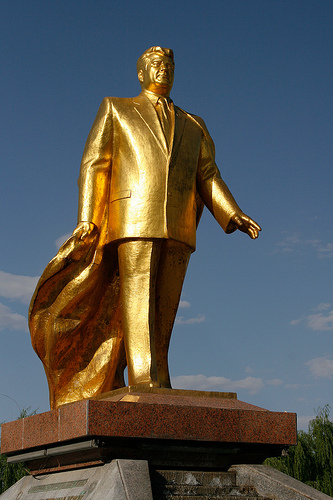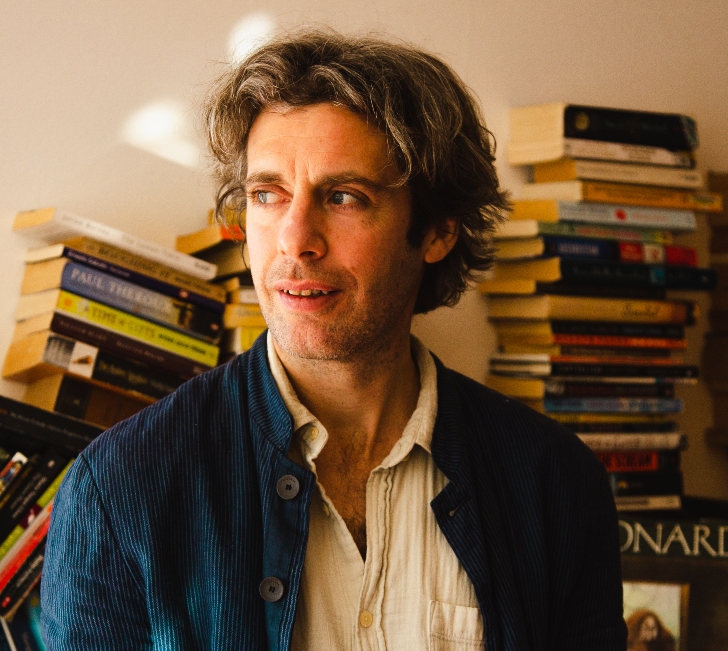
The day that Simon Simonov won the presidential election was the happiest moment of his life.
‘For my part I wanted only to be a humble shepherd,’ he declared. ‘but who can deny it is is the will of the people that I rule them?’
When journalists ventured to point out that as he had been the only candidate allowed to stand for election the result was hardly surprising, Simon Simonov gave one of his trademark beaming smiles, had the critics executed and their heads stuck on spikes outside the presidential palace.
‘Again, I ask, who can deny is the will of the people that I rule them?’
This time everyone agreed.
Not only could Simon Simonov not tolerate any opposition in the present but the existence of previous rulers troubled him, too, so he smashed their statues, tore down their portraits and burned all of the history books as well.
‘The fate of Simonistan,’ – thus he had renamed the country – ‘begins in the present moment” The present – do you see? It is my gift to you!’
 One day a wise man left his mountain cave where he had been meditating for 50 years and walked down into the city. He walked barefoot through the streets past beggars who crouched beneath giant gold statues of Simon Simonov in various smiling poses, past overcrowded jails where prisoners took turns to breathe fresh air at the window, and walked straight into the palace and demanded an interview with the president.
One day a wise man left his mountain cave where he had been meditating for 50 years and walked down into the city. He walked barefoot through the streets past beggars who crouched beneath giant gold statues of Simon Simonov in various smiling poses, past overcrowded jails where prisoners took turns to breathe fresh air at the window, and walked straight into the palace and demanded an interview with the president.
Simonov was carried in on an ivory chair held aloft by 8 men and, wiping gravy off his moustache with a silken sleeve, he looked down upon his guest and asked:
‘Wise old man of the mountains! What have you come to teach me?’
‘How can the head live when the body starves?’ the old man told him sternly, ‘Your people are hungry and miserable. They fear you but would you not rather have their love?’
‘And what must I do to win their love?’
‘Look only inside yourself.’
After Simonov had the old man executed and his head stuck up on a spike, he retired to his presidential bedchamber to meditate upon the advice he had been given. At length, he rose and walked into the marble bathroom and regarded himself in the mirror, contemplating at his bloodshot eyes, his fat nose and twirling moustache until he broke down and cried. How could he not have seen it before? Looking deep inside himself he saw that he was indeed lovely! What should he care what any others thought or said about him? He loved himself and that was enough!
From that day on, he made six of his servants carry a full-length mirror around in front of him at all time so that wherever he might turn he would always see his own charming features smiling back at him. He found that he always agreed with himself and whenever he made a joke his reflection was the first to laugh. Of course, it wasn’t a perfect solution – on occasion a servant would be too slow with their hands or trip over and he’d have to have them executed and send for someone with quicker hands and feet.
Nature, too, seemed to be against him. One afternoon, while talking to himself in the presidential gardens, the weather turned stormy and though he and his bearers hurried towards the palace they were not in time to prevent a powerful hail storm smashing his beloved mirror into a thousand pieces.
Weeping bitterly, Simonov allowed himself to be carried back to the presidential bed chamber and he remained there for 40 days and nights, reflecting upon the tragedy until at last he rose and announced that he would speak to the people. A crowd of tens of thousands awaited him in Simonov Square, wildly cheering his name when he took the stage – it was that or go to jail, after all. The president waved down the cheers with a modest hand and declared:
‘Enough! Enough! My people, I have been, let us admit it, a fool. I thought that all I had to do was see the beauty inside myself and that would be sufficient. Well, I have learned an important lesson: the time has come to see the beauty in you, too – from this day on we will see the beauty of Simon Simonov in everyone!’
The crowd clapped nervously, wondering what this might mean and they didn’t have to wait long to find out. The next day the police arrived at each house in the city and made everyone inside walk through a cardboard cut out image of the president. All of those who were too tall or too wide to squeeze through the shape were loaded onto ships which were sailed out to sea and then sunk by the air force.
The remaining population were ordered to change their appearance to resemble Simon Simonov and roadblocks were set up to make inspections when citizens passed. So everyone rubbed salt in their eyes to make them red and sore, stuffed cotton wool into their nostrils to make their noses fatter and the men grew moustaches long enough to twirl around their little finger – the women and children had to glue on hair from horse’s tails.
Every male citizen was obliged to change his name to Simon Simonov and the women to Simona Simonov; the net effect of which was that people gave up on using the post office, which had already been in considerable confusion now that every address in the city was called Simonov Street, Simonov Road or Simonov Square.
And yet the president was still unsatisfied. He decided to change the names of the days of the week, too: Monday became Simonov, Tuesday was Simonov Simonov, Wednesday Simonov Simonov Simovov and so on. A 50 Simonov fine was issued for anyone who made a mistake.
Simon Simonov could now see his face wherever he looked and hear his name hundreds of times a day and yet he felt a growing jealousy for all the other words in the language Irritating little words like ‘and’ or ‘but’ or ‘hot’ or ‘cold’ – in fact, it seemed there was no end to the ways the language conspired to make people talk about anything except himself. Calling in master linguists from around the world, the president retired to his palace with them for several months until, on the anniversary of his rule, he emerged to greet an enormous red-eyed, fat-nosed, moustachioed crowd and he boomed:
‘Simonov Simonov Simonov! Simonov – Simonov, Simonov Simonov! Simonov!’ And so on for over an hour. It was later explained to the crowd that, mirroring the tonal system found in Asiatic languages, the sound Simonov could be said with 6 different tones and so any 5 combinations of the word could represent up to 50,000 possible meanings! In fact, from that moment on, they were told, it would be an offence punishable by death to utter any word other than Simonov.
A book written by the Simon Simonov himself was issued to every house in the city and conttained all of the practical, political and spiritual wisdom the leader had acquired in his lifetime. But as the only word contained within was simonov, few claimed to understand it. In fact, the new language was so difficult to learn that speaking soon became a thing of the past and people went about their business in silence beneath the ubiquitous gold statues of Simon Simonov in his various smiling poses.
With no voice to distinguish them, and each trying to look as much like the president as possible in order to avoid arrest, people began to forget who each other was. Husbands returned home at night to the wrong houses, mothers picked up the wrong children from school and people went off to work in the wrong jobs – a bus driver one day, a dentist the next.
Simon Simonov’s dream had come true; he had achieved perfection and thus brought about his own end. Returning from the bathroom one afternoon he found a fat-nosed man with a twirling moustache sat on the presidential throne in his place!
‘Simonov! Simonov!’ he cried indignantly. But his double simply looked down upon him with bloodshot eyes and roared:
‘Simonov Simonov Simonov Simonov!’ and 4 guards stepped up to drag the protesting president out into the garden where they cut off his head and stuck it on a spike outside the palace.
The next day the people of the city gathered to hear the president speak and waves of confusion and relief spread through the crowd as they saw him tear off his moustache and, speaking in the old language, declare a new start for everyone. Shouts of celebration echoed through the square as they pulled the cotton out of their noses and threw their moustaches in the air, cheering wildly the name of their new president, Alex Alexander and the Republic of Alexanderstan…







